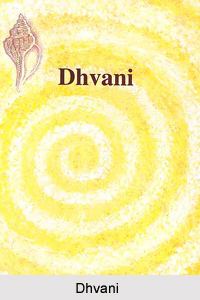 The literal meaning of Dhvani is `reverberation` or `suggestion`. This is an aesthetic concept that occupies an important place in Indian poetic theory, hence in Sanskrit theatre. Anandavardhana in ninth century was the first exponent of the Dhvani school of literary criticism, further elaborated by Abhinavagupta in 950-1025, whose Locana or `Eye` is a commentary on Anandavardhana`s Dhvanyaloka or `Light on Dhvani`.
The literal meaning of Dhvani is `reverberation` or `suggestion`. This is an aesthetic concept that occupies an important place in Indian poetic theory, hence in Sanskrit theatre. Anandavardhana in ninth century was the first exponent of the Dhvani school of literary criticism, further elaborated by Abhinavagupta in 950-1025, whose Locana or `Eye` is a commentary on Anandavardhana`s Dhvanyaloka or `Light on Dhvani`.
According to Dhvani theory, the content of a good poem may be divided in two parts. One is directly expressed through the power of denotation of the words, and may include the meaning hinted at by their power of connotation or lakshana. The other, taken to be the soul of poetry, is the unexpressed or suggested meaning i.e. vyangya, i.e. `revealed`, or dhvani, sometimes linked with the denotative and connotative meanings of the words.
Tradition delineates three types of dhvani. When the expressive words offer their direct meaning and, in turn, suggest some other, charming, matter (vastu) or idea, it is called vastudhvani. For instance, `the sun has set` may mean to a peasant that it is time to stop tilling the field, whereas for a housewife it may suggest, `It is time to cook the food.` When in addition to the expressed meaning, some striking and embellished meaning is suggested, it becomes alamkara (ornamental) dhvani, understood as different from the expressed figure of speech. And when a poet, by carefully choosing his words, makes them convey far more than their bare meanings and so induces a whole series of emotions it creates rasadidhvani.













